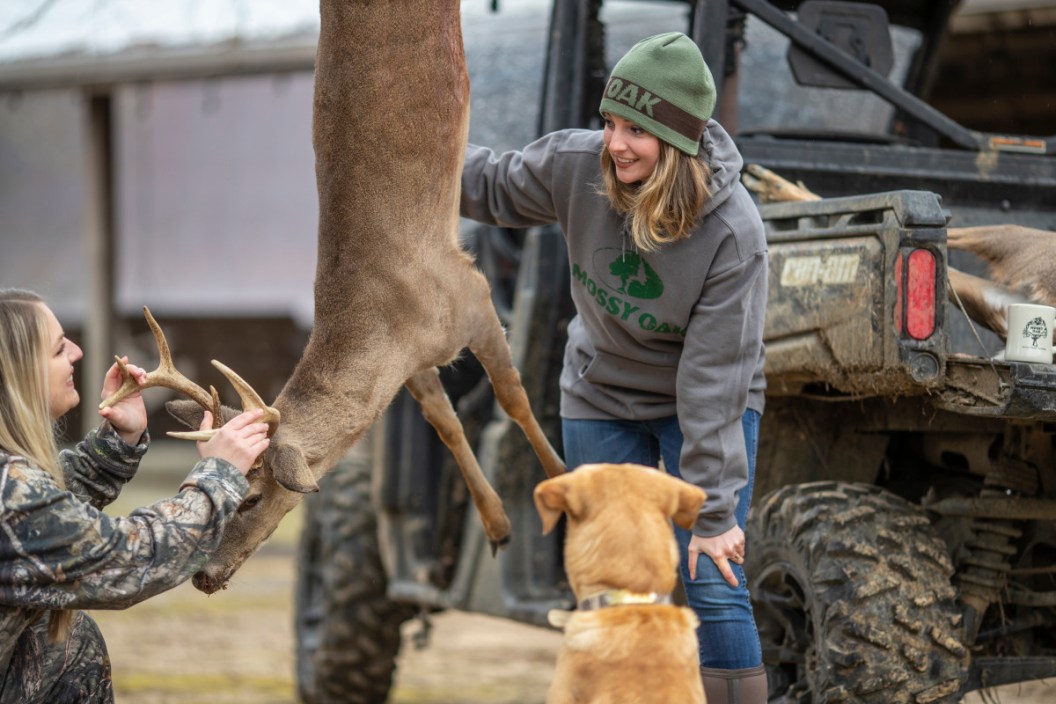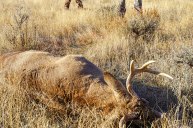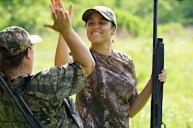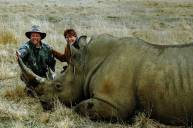We hear all the time about how hunting is more than an American tradition. It helps aid in wildlife management and wildlife conservation. But have you ever stopped to think about what exactly those things mean?
If you haven't, here are some things conservationists are talking about when they talk about conservation efforts.
And these are things you'd be foolish if you weren't dedicating yourself to if you want to be part of protecting our precious natural resources the right ways.
Buy as many hunting licenses as possible
Most sportsmen and women already know that the money from hunting licenses goes directly back to your state or provincial wildlife agency to fund conservation. In many cases it helps these agencies acquire new acres of habitat, saving them from habitat loss. In some instances, this may help protect an endangered species!
These funds also go to hunter education, conservation programs and help pay the salaries of our hard-working game wardens who dedicate so much of their time to catching poachers.
If you're an avid hunter who has been considering hunting some new species of wild animals in new places this year, do it! Even if you can't do it more than a few days or are unsuccessful, that money you spent is still going to a good cause.
Checking your harvests
There are several good reasons to take your harvests to your local check stations, even if checking in isn't mandatory for your state or province.
Many North American wildlife agencies depend on hunter-harvested game animals to give them vital data on wildlife populations, hunter success ratios, overall herd health and disease control. This data helps these agencies establish or change hunting seasons based on need and helps them catch problems that need addressing.
The importance of checking harvests is particularly important for things like disease control. Imagine if the data acquired by biologists from your harvest helps nip an outbreak of blue tongue disease or epizootic hemorrhagic disease (EHD) before it becomes a big problem.
CWD requires deer checks in many parts of the country, and if you're disobeying that regulation, you owe it to the rest of the hunting community to seriously reconsider your decisions. Don't be that guy. Everyone despises that guy.
And there's another part of this to think about. It's not just state agencies that are often under-staffed and under-funded in their work. The U.S. Fish and Wildlife Service also needs all the help they can get too. It might be easier than you think to provide them with relevant data.
If you can find hunting or fishing surveys put out by either federal or state agencies, do your best to fill them out factually and truthfully. The data you provide will help shape wildlife programs and the protections of wild places like our National Parks in the future. Every little bit of data they can get goes towards overall conservation efforts.
Harvesting antlerless animals
I know, we all want to harvest that big buck each season, but big game animal populations depend greatly on balance. Balance can only happen if people hunt to help keep things in check.
If the DNR or other wildlife agency has issued more antlerless tags than normal this year, it's probably for a good reason. Chances are they've been crunching the data on hunter harvests and deer/motorist encounters over the course of several years, and there are more does than there should be in your area.
If you're like me, you might be thinking: "But I don't want to harvest more than I need!" This is a fair point. We don't like meat going to waste. However, there are options. Consider donating your venison to an organization like Farmers and Hunters Feeding the Hungry or Hunters Helping the Hungry.
These organizations will often charge you a small fee to have the meat processed, but it's worth it.
The benefits are two-fold. You're helping do your part for conservation in your area and you're helping people in your local communities who are a little down on their luck. That's a win-win scenario for everyone.
Help keep your hunting area clean
If every hunter in the United States dedicated themselves to picking up just one bag full of trash left in the woods this season, imagine how much cleaner our hunting areas would be. Game animals of all kinds, whether it is waterfowl, rabbits and squirrels or large game animals like elk and moose, are going to be healthier in an environment free from human debris.
Even something as simple as picking up a discarded doe pee bottle, some shotgun shells or some beer cans from the parking lot of your public hunting area will make a difference in the long run. It makes our playground cleaner while showing that hunters really do care about the environment and the outdoors.
If you want to make an even greater impact, organize with your local hunting groups! Adopt a highway through a prime deer travel corridor or get your group to help clean up the local fishing hole. Show others and lead by example. The result is a more enjoyable time in the outdoors for humans, and a healthier natural environment for the animals.
Being mindful of how you represent hunting
Some people might not like what I have to say in this next part, but we as hunters need to be more thoughtful in how we present ourselves and hunting to the non-hunters out there. Now, when I say this, I'm not talking about anti-hunters. I already wrote an extensive piece on why they're a lost cause and we shouldn't even bother. I'm talking about people, many of whom AREN'T vegetarians, who do NOT hunt.
You may be asking why we need to be mindful, especially on social media, but there's a very good reason. Let's flash back to the "Cecil the Lion" incident back in 2015. This incident shined a big spotlight on trophy hunting in Africa to an audience who was wholly uneducated on the matter.
It didn't matter how much advocates and even local officials in places like Namibia, Botswana, Tanzania, Kenya and South Africa tried to explain that hunting funds conservation and helps thwart poaching. The damage had already been done, and trophy hunters are now often fed to the internet masses without mercy.
Incidents like the Cecil controversy have real-world effects on hunting. New Jersey banned the import of trophy animals due to the outcry from Cecil. I'm sure there will be one heckler out there who will say: "Who cares? I'm never going to hunt black rhino in Africa. Not my problem!"
To that, I answer: today it's African lions and rhinos, tomorrow it could be a big bull elk you worked hard for in the Colorado Rockies.
If we as hunters really want to help, whether or not we want to frame ourselves as conservationists, we must be mindful about the things we say, do and the things we post online.
If there's a chance the photo of your harvest could upset someone, is it really necessary to post it in a public place?
Still don't think it's a big deal? Look at the Josh Bowmar incident in 2016. Josh successfully harvested a black bear with a spear in Alberta and he immediately became the target of public outrage. Two years later, Alberta banned the use of spears for hunting as a direct result of this incident. What's next compound bows?
Think about the image of hunting you may be presenting to someone unfamiliar with hunting. Let's emulate Theodore Roosevelt in our actions in the woods and interactions with the non-hunting public. Don't engage the trolls. Teddy didn't need to attack non-hunters and call them stupid to get his point across. He used facts and his actions to show how hunting helps conservation.
I'm a big fan of Steve Rinella. He's a prime example of doing things like this in a respectful manner. Let's work on doing the same this year.
For more outdoor content from Travis Smola, be sure to follow him on Twitter and check out his Geocaching and Outdoors with Travis YouTube channels.
NEXT: YOU ACTUALLY DON'T HAVE TO KNOW HOW TO BUTCHER A DEER COMPLETELY
WATCH





